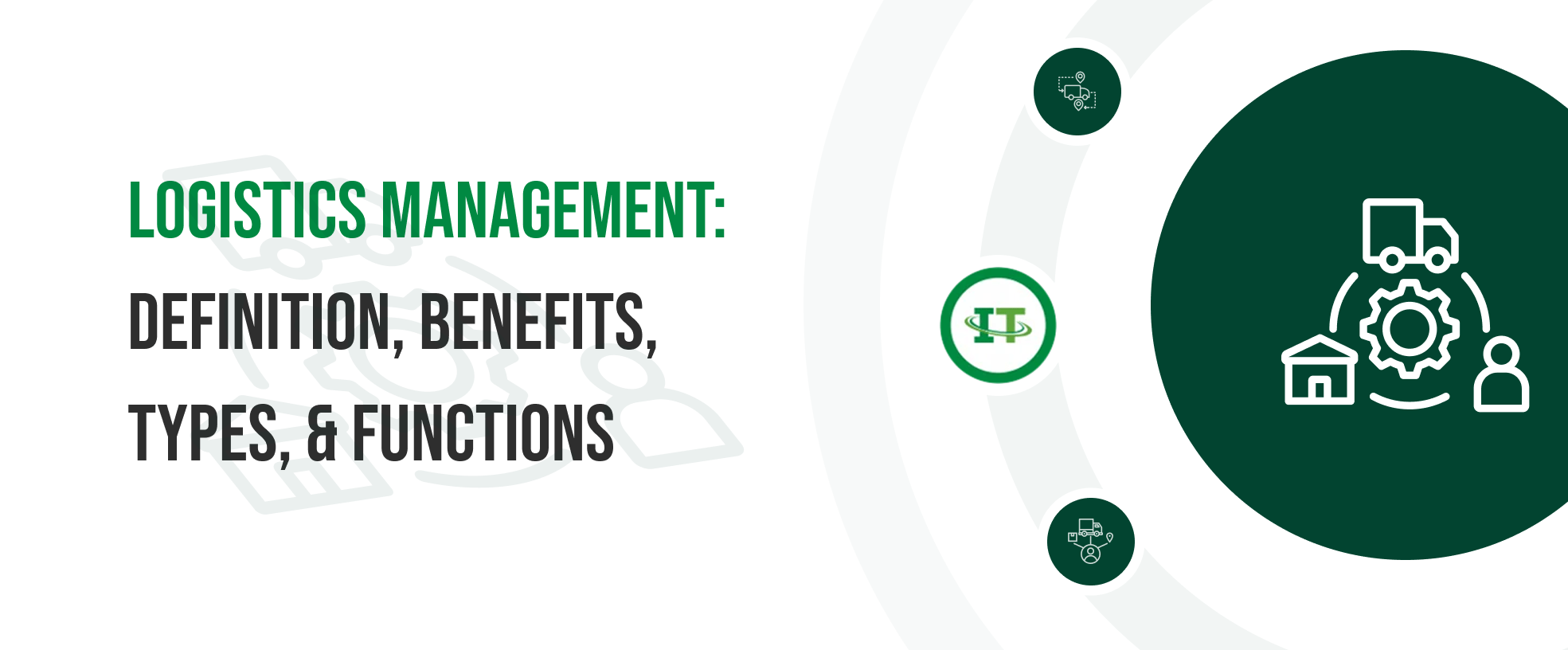What is Logistics Management? Definition, Benefits, Types, & Functions

Today’s leading real-world retailer, Wal-Mart, uses software to power its logistics and distribution capabilities, which it has used to crush its competition. — Marc Andreessen
Logistics management is the heart and soul of the supply chain. It refers to systematically handling complex operations involving movement, storage, delivery, and other related tasks. We’ll explore many more things besides knowing what logistics management is. So, let’s dive in!
What Will We Cover?
- What Is Meant By Logistics Management?
- What Are The Challenges Faced in Logistics Management?
- Advantages And Benefits Of Logistics Management
- What Are The Different Types Of Logistics Management?
- Key Functions of Logistics Management
- Best Practices And Tips For Enhanced Logistics Management
What is Meant By Logistics Management?
To understand what logistics management is, let’s first discuss Logistics. To put it simply, logistics means the detailed coordination and transportation of goods from the point of origin till their consumption. The process ensures that goods are delivered on time and in good condition.
On the other hand, logistics management is a strategic part of the supply chain that entails proper planning, execution, and complete control. It helps optimize costs, improve delivery speeds, and increase reliability. From storing goods to their movement until they reach the customer, the process handles everything.

In today’s highly competitive market, managing logistics effectively is a necessity. It not only helps optimize costs and minimize errors, but it also reduces waste and cuts down on delivery errors to a great extent. With trending technologies like AI in logistics, blockchain, and IoT, logistics management has undergone a complete transformation. It is a key driver of any logistics business’s success.
Did you know? According to Statista [1], the market of Content Management Software is expected to demonstrate an annual growth rate (CAGR 2025–2029) of 4.84%. This would result in the market volume reaching US$28 billion by 2029.
What Are The Challenges Faced in Logistics Management?
Logistics management is an indispensable lifeline of the supply chain, as the challenges of the logistics industry continue to rise. Rising transportation costs, supply chain disruptions, a lack of skilled workforce, environmental issues, and last-mile delivery challenges are some of the pressing concerns.
Let’s move on to another important section: the benefits of logistics management, to understand the importance of logistics supply chain management in addressing these concerns.
Advantages And Benefits of Logistics Management
Logistics management offers a wide range of benefits that increase overall efficiency and performance. However, it ensures the seamless coordination of goods and resources throughout the supply chain. It reduces operational costs, minimizes delays, and saves resources. Let us check out the benefits of logistics management in detail.

1. Cost Reduction in Transportation and Warehousing
If you have implemented the right logistics software, you can identify cost-effective routes and carriers. Also, managing logistics effectively helps reduce fuel consumption, minimize empty miles, and lower storage costs.
In warehousing, it enables optimal space utilization and efficient inventory management, which lowers storage costs. By automating these processes, businesses can significantly reduce manual errors and overhead costs.
2. Better Delivery Performance
Logistics in supply chain management helps with order tracking, provides real-time updates, and optimizes routes. This all leads to quicker deliveries and gains customers’ loyalty. Also, the feature of real-time alerts, scheduling delays, and disruptions can be controlled.
3. Inventory Tracking & Management
One of the primary purposes of the inventory tracking and management system is to track inventory and provide complete visibility of stock levels. With the help of accurate inventory tracking, businesses know where the products are and where they are located. Bringing transparency and preventing stockouts.
4. Higher Customer Satisfaction
Timely and accurate delivery, combined with useful tools, leads to a higher customer satisfaction level. It minimizes delays, improves deliveries, and keeps your customers engaged. Happy and satisfied customers give repeat business.
5. Better Supply Chain Operations
Managing logistics the right way helps streamline all stages of the supply chain, from procurement and production to final delivery. It enables you to identify bottlenecks in the supply chain and improve coordination between departments, resulting in a better and coordinated supply chain.
Let’s explore the types of Logistics management and how they help the supply chain!
What Are The Different Types of Logistics Management?
The world of supply chain is large and interconnected. Logistics management is an invisible engine that powers hassle-free and smooth operations. Whether it’s about handling raw materials, tracking them on route, or delivering them to end customers, logistics ensures that products reach customers on time at a low cost.
Inbound, Outbound, Reverse, and third-party logistics each have a specific function in running logistics operations successfully. Inbound logistics refers to the movement, storage, and delivery of goods that enter a business. There are multiple types of logistics, a few of them are mentioned here:

Inbound Logistics
It involves receiving raw materials and components from the suppliers. When done right, it helps significantly in lowering costs, preventing production delays, and reducing lead times.
Outbound Logistics
On the other hand, outbound logistics involves handling the finished goods that leave the warehouse shelves to reach the customers. It includes picking, packaging, transportation, and delivery. On-time delivery to the customers, lower shipping costs, and transparency in the delivery process lead to satisfied and recurring customers.
Reverse Logistics
It is the process of moving goods from the customers back to the manufacturer or seller for repairing, recycling, and disposal. Reverse logistics is not just backward logistics. It plays a crucial role in the supply chain, as it drives loyalty and builds a brand’s reputation.
3rd Party Logistics
Third-party logistics, or 3PL, refers to logistics outsourcing. These service providers specialize in various functions, such as inventory management, transportation, warehousing, and reverse logistics. Instead of managing these important supply chain tasks in-house, businesses outsource them.
Next up are the key functionalities of logistics management that make it as important as other aspects in controlling supply chain operations.
Key Functions of Logistics Management
What logistics seems to a layman is about goods transportation only. But, there is much more than what meets the eye. Logistics is the planning, execution, and optimization of core supply chain operations to meet the demands of end customers. At its core, logistics handles multiple roles that influence efficiency, customer satisfaction rate, and inventory control.
Here is a quick view of the five top core functionalities of logistics management:

1. Transportation Management
This is the functionality that ensures goods move through the appropriate modes, such as rail, air, sea, or road. Logistics managers handle everything from carrier selection to route planning, freight auditing, and more.
2. Inventory Management
Inventory management involves monitoring stock levels and forecasting demand to prevent under- and overstocking. Inventory tracking ensures that products are always available when and where they are needed.
3. Storage and Warehousing
Storage and warehousing are major concerns in logistics operations. Warehouse management involves activities such as picking, packing, order management, and fulfillment. An efficient warehousing process ensures faster deliveries and happy customers.
4. Order Processing and Fulfillment
It covers the entire lifecycle of customer orders, from the moment they are received to when they are picked, packed, shipped, and delivered. Accurate and timely order fulfillment leads to a high customer satisfaction rate.
5. Logistics Information Management
Logistics information management is the process of gathering, processing, and analyzing logistics data. The latest logistics software and smart technologies help in real-time tracking, providing data insights, managing warehouse tasks, and decision-making.
Best Practices And Tips For Enhanced Logistics Management
An efficient logistics management gives you an edge. In the ever-growing logistics market, businesses should adopt smart strategies, integrate the latest technologies, and utilize the necessary tools to stay ahead.
Implementing these best practices will cut down delays and errors:
- Real-time tracking feature for better shipment visibility to identify transportation issues.
- Data Analytics and Artificial Intelligence help with demand forecasting, route optimization, and better decision making.
- Warehouse automation for faster fulfillment of orders and to reduce human errors
- Integrate systems like TMS, ERP, and WMS to help in smoother coordination across various departments.
- Sustainable practices save the environment and reduce carbon footprints.
- KPIs and performance monitoring for measuring efficiency and identifying areas that need improvement.
- Use a logistics software to ease the tasks and get a streamline process of all the supply chain operations.
Apart from these, regular audits, maintaining strong supplier relations, and predictive analytics also help.
Check Out CommuteLogix – Logistics Management Software!Wrapping Up
Rome was not built in a day. As a business, if you’ve started taking small steps to improve logistics operations, you should also adopt the right strategy and a robust logistics software. When you know its various types, core functionalities, and what best practices to embrace, you are on the right track to get an edge.
Key Takeaways
- Logistics management is the process of handling and managing goods from the time they enter the supply chain until they reach the end customers.
- Core functionalities of logistics management are warehousing, order fulfillment, inventory management etc.
- Inbound, Outbound, Reverse, and 3rd party logistics are the different types of logistics.
- Best practices for managing logistics include automation, real-time tracking, and strategic planning.
- A robust logistics software with all the features can be a game-changer and contribute to overall success.
Frequently Asked Questions (FAQs)
Let us know what you want to know anytime. Here are some of the top queries resolved.
1. What is logistics management in the supply chain?
Logistics management is planning, handling, and controlling the movement and storage of goods, services, or information in the supply chain. It manages all the supplies from the point they enter the supply chain until they reach the end-customers.
2. What are the different types of logistics providers?
Different types of logistics providers include first-party (1PL), second-party (2PL), third-party (3PL), and fourth-party (4PL). These logistics providers have their own different roles and functions.
3. What is logistics software?
Logistics software is a digital tool that automates logistics processes, including tracking, inventory management, delivery, and other related tasks. It is indispensable for managing logistics businesses.
4. What are the use cases of logistics software?
There are various use cases of logistics software, ranging from warehouse automation to route optimization. Get better shipment tracking and better performance analytics with logistics software.
5. What is a logistics company?
A logistics company is an organization that manages and streamlines the flow of goods from the point of origin to their destination. Warehousing, transportation, and order fulfillment are some of the tasks handled by a logistics company.
Supply Chain Snags Suck And Siphon Off Your Profits?
Get The Best Logistics Software To Streamline Supply Chain!
iCommuneTech is a trusted provider of logistics software. You can have better efficiency with logistics management with us. Our robust Logistics software has been helping businesses worldwide manage their supply chains without hassle and driving huge profits
Contact us today to get a free quote.
References
1. Statista report – (Source)
Irshad Pathan

Web Development Expert
Irshad is a senior technical expert at iCommuneTech. He manages the iCommuneTech's Web Development Team, and has hands-on expertise in web development, Laravel development, Logistics, fleet management, and Supply Chain Management. He mentors the in-house team and enjoys describing his experience in words.
Read More Insights By Irshad →